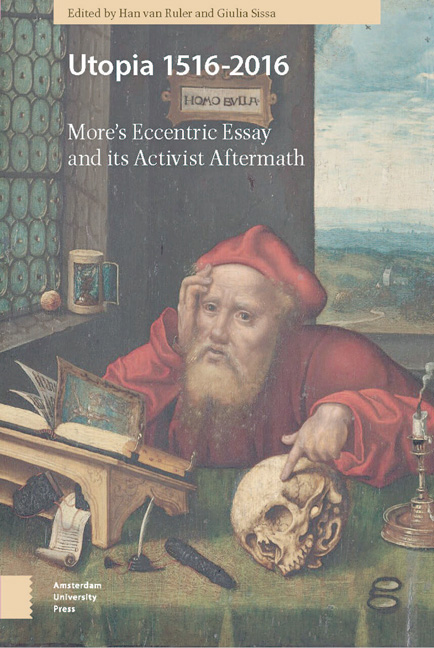Book contents
- Frontmatter
- Contents
- Introduction
- PART 1 THE BOOK
- A Praise of Pain: Thomas More’s Anti-utopianism
- Bodies, morals, and religion: Utopia and the Erasmian idea of Human Progress
- PART 2 ORIGINAL RECEPTION
- Realism Vs Utopianism: The Problem of the Prince in the Early-Modern Netherlands
- From Thomas More to Thomas Smith: Utopian and Anti-Utopian Understandings of Economic Change in Sixteenth-century England
- PART 3 PHILOSOPHICAL CRITICISM
- Reflections on the Utopian Mind
- Utopianism in Today’s Health Care
- PART 4 PHILOSOPHICAL ACCLAIM
- Utopianism and its Discontents: A Conceptual History
- The integrity of Exacerbated Ambiguity: More’s Utopia as an Evaluative Thought Experiment
- Index
Utopianism and its Discontents: A Conceptual History
Published online by Cambridge University Press: 12 December 2020
- Frontmatter
- Contents
- Introduction
- PART 1 THE BOOK
- A Praise of Pain: Thomas More’s Anti-utopianism
- Bodies, morals, and religion: Utopia and the Erasmian idea of Human Progress
- PART 2 ORIGINAL RECEPTION
- Realism Vs Utopianism: The Problem of the Prince in the Early-Modern Netherlands
- From Thomas More to Thomas Smith: Utopian and Anti-Utopian Understandings of Economic Change in Sixteenth-century England
- PART 3 PHILOSOPHICAL CRITICISM
- Reflections on the Utopian Mind
- Utopianism in Today’s Health Care
- PART 4 PHILOSOPHICAL ACCLAIM
- Utopianism and its Discontents: A Conceptual History
- The integrity of Exacerbated Ambiguity: More’s Utopia as an Evaluative Thought Experiment
- Index
Summary
Abstract
Utopianism is often rejected out of hand for one of two reasons: either it is thought to be politically dangerous, or it is thought to be a mere fantasy. It is nevertheless an important theme in contemporary political philosophy. This article reviews part of the political-philosophical career of ‘utopia’ as a concept by considering the different traditions that have been influential in shaping the way utopia and utopianism are perceived today. A brief reading of Thomas More's Utopia is followed by a consideration of the utopian socialist tradition and Karl Marx's criticism of it. The Marxist understanding of utopia continued into the twentieth century. Utopianism's bad reputation is partly due to its association with the attempt to realize communism in the Soviet Union, but other factors include the Eastonian empirical turn in political theory and the onset of postmodern incredulity. It made a perhaps surprising comeback in the work of John Rawls, whose work was recently criticized by Amartya Sen for being overly ‘utopian’ – a criticism that is highly analogous to Marx's onslaught against the utopian socialists. With the help of counterarguments devised by Pablo Gilabert, the article considers three ways in which utopianism can be useful to contemporary political thought.
Keywords: utopianism, Thomas More, utopian socialism, distributive justice and utopia
Introduction
Every concept is controversial in academic philosophy, but some are more equal than others in this respect. Utopia and its twins ‘utopian’ and ‘utopianism’ have long been regarded with great suspicion. Leszek Kolakowski once said that the trouble with utopias is not that designing one is too hard, but rather that it is too easy. We can certainly sympathize with such worries. In the name of furthering the ideal society, many evils can appear permissible. The phrase ‘for the greater good’ looms large over any utopian project, and its promise to those who choose to wield it cynically is that any concern can be subordinated under the great project as the ‘cunning of reason’. The truly awful is transformed into the only apparently awful, providing a readymade justification for the breaching of any previously inviolable moral value.
- Type
- Chapter
- Information
- Utopia 1516-2016More's Eccentric Essay and its Activist Aftermath, pp. 207 - 224Publisher: Amsterdam University PressPrint publication year: 2017
- 1
- Cited by



